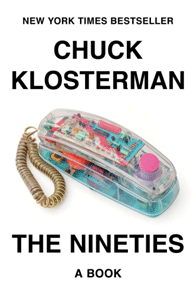In his new hardcover book “The Nineties,” Chuck Klosterman illustrates the nature of traditional network TV with a “Seinfeld” reference from 1992. Why would people watch the show Jerry and George are pitching? Because it’s on TV.
Likewise, I read the chapters of topics I was less interested in – namely politics – because it’s in Klosterman’s book. And like a viewer who tunes in to “Seinfeld” “because it’s on TV,” I was pleasantly entertained by these chapters.
As always, Klosterman (whose work I read in the Forum of Fargo-Moorhead when I was in high school and college in the 1990s) writes tasty sentences that string into delicious paragraphs and chapters. His prose is a pleasure to read, and occasionally he hit me with a great bit of insight.

It’s an outstanding book, maybe even his best, and it inspires me to analyze pop culture like he does. So I will, taking cues from Klosterman’s topics in “The Nineties.”
Politics
I dreaded these chapters because I know my libertarian views don’t line up with Klosterman’s mainstream statist views, and I braced myself for tired “wasted votes” and “Perot/Nader cost him the election” stuff. I shouldn’t have; Klosterman is wiser than that. The chapter on Perot is enlightening, as is the chapter on the 2000 election.
(By the way, 2000 isn’t in the Nineties in terms of date, but Klosterman is writing about the Nineties as a cultural period. He defines the bookends as the Berlin Wall’s fall in 1989 and the World Trade Center’s fall in 2001. This is also a perfect metaphor for how the decade was the last good one in human history – at least for now.)
Klosterman reminds us that Bush and Gore were interchangeable (they agreed on almost every issue), so it didn’t matter to the average person who won. However, the fact that the election was super-close, combined with many people’s dislike of Bush in the coming years, made politics turn ultra red-and-blue.
To someone opposed to statism in any form, that doesn’t matter – the two major-party candidates always agree on war, debt, mass incarceration and the principle that citizens are subjects rather than free individuals. But today it is rather surprising to see that, for example, abortion rights are being dialed back – a case of the partisan game being ratcheted up. The author convincingly traces this back to the 2000 election.
Television
Klosterman notes that “The Sopranos” (1999-2007) was the first “prestige” TV show, and he contrasts it with the traditional, pre-streaming era. He’s not saying there were no quality TV shows before streaming, but he does remind us that people watched TV shows because they were on TV.
He sharply notes that shows like “Room for Two,” “The Single Guy” and “Veronica’s Closet” drew tens of millions of viewers because they aired in the programming block with “Friends” and “Seinfeld,” yet they’ll never be mentioned in reflections about important shows in TV history.
Klosterman acknowledges that “ER” and “Frasier” would be “prestige TV” if they existed today, but overall he’s a little too accepting of the old “vast wasteland” notion of pre-streaming TV. He undersells “The X-Files” (which he recounts warmly) and “Buffy” (which he doesn’t mention) — but those are my biases.
In my opinion, the way people watch TV has changed more than the content of TV. The line between “traditional” and “prestige” is real but blurry. Some showrunners were able to push the boundaries of traditional TV from the inside.
Consider that the Palladinos’ “Gilmore Girls” (which started in 2000 – still the cultural Nineties) and “The Marvelous Mrs. Maisel” have the same dialog and storytelling rhythms. The latter can have a flexible runtime, but the Palladinos used their “That’s enough story for one episode” philosophy even when confined to 44 minutes.
And consider that last year “Evil” switched from traditional (CBS) to prestige (Paramount Plus). But the content changed only superficially, adding slightly more swearing and sexual images.
Movies
Klosterman posits that Quentin Tarantino ushered in an era where movies could be about movies – in the sense that Tarantino purposely made movies that looked like older movies he liked. They didn’t have to have sharp or original themes. Klosterman pulls out 1994 reviews of “Pulp Fiction” to illustrate how critics were baffled by this new approach.
The author reminded me of something I had since forgotten: “Titanic” became the box-office king because teen girls were smitten with Leonardo DiCaprio. I once wrote a defense of why “Titanic” shouldn’t be denigrated for being grossly successful, but “The Nineties” points out that sometimes cultural phenomena have a simple explanation.
Music
While this isn’t as eye-poppingly insightful, Klosterman points out that the grunge movement of the early 1990s – a reaction to glam rock of the 1980s (the zenith of rock’s absurdity) — marked the end of rock as a cultural movement.
In the grunge aesthetic – most famously embodied by Nirvana’s troubled frontman Kurt Cobain — it was important to show that you didn’t care about being commercially successful. In fact, popular musicians of the time were often outspoken against being popular. Even being noticed for talent made Cobain and his disaffected contemporaries uncomfortable.
Klosterman extends this to the general Gen-X (the generation that came of age in the 1990s) worldview. Although I didn’t follow Nirvana and other grunge bands closely, that state of mind where it was uncool to care (and cool to not care) palpably came back to me when reading Klosterman’s prose.
The Internet and beyond
Since the Nineties, politics has changed a little for the worse, TV has changed a little for the better (the way we watch TV has changed a lot for the better), and the most popular musicians and movies don’t rule the world like they used to.
And, of course, the Internet has changed the way we communicate and acquire knowledge (or “knowledge,” as it were). (This is an “of course” only to Gen-Xers, younger Boomers and older millennials. Older folks could avoid the digitization of culture; younger people didn’t experience the analog era.)
Klosterman hits the nail on the head with his observation that we were allowed to not care in the Nineties. You could say you don’t vote without getting your head ripped off. Can you express a lack of interest in, for example, transgender rights today without getting everyone mad at you?
Every generation feels like the past was a simpler, better time. Klosterman himself argues that this is a function of nostalgia, not reality. But, ironically (to give a nod to Alanis Morissette’s misnamed hit song), he makes a strong case that our biased impressions aren’t wrong.
“The Nineties,” for all its good and bad and silly moments, is a robust collection of evidence that the Nineties were a better time to live.


